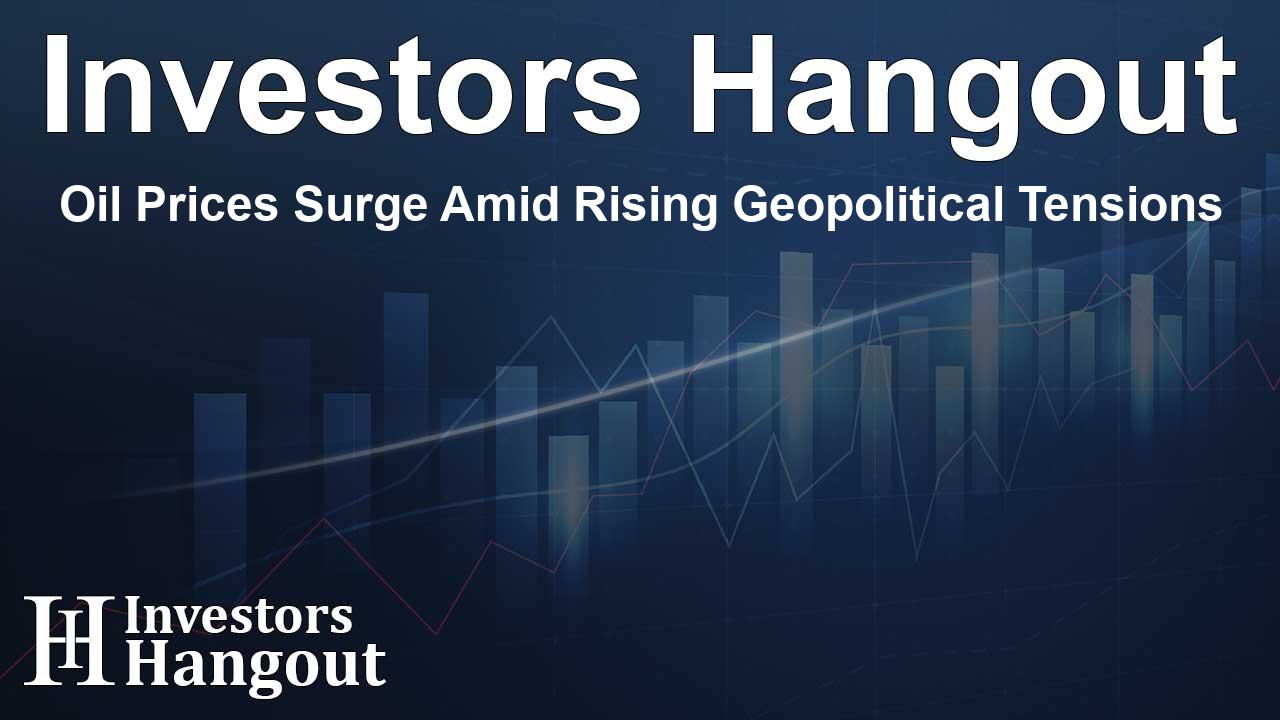Oil Prices Surge Amid Rising Geopolitical Tensions

Current Trends in Oil Prices
Oil futures had a notable week, experiencing the largest weekly increase in over a year. This surge comes amid heightened geopolitical tensions, particularly as President Biden urged caution regarding potential military actions involving Iran's oil facilities, following missile strikes against Israel.
Market Movements and Price Settlements
On the recent trading day, West Texas Intermediate (CL=F) experienced a minimal rise, closing at $74.38 per barrel after peaking earlier in the session. Despite some hesitance, US crude still managed to finish the week with more than a 9% increase, marking a strong performance since early March.
Brent crude (BZ=F), which serves as the international benchmark, also saw a slight uptick, settling at $78.09 per barrel. The overall market sentiment was influenced heavily by the ongoing dialogue surrounding the instability in the region.
Political Climate Impacting Oil Prices
President Biden's remarks hinted at a strategic approach to the situation, suggesting alternatives to direct assaults on oil infrastructure. He emphasized that targeting these vital resources could result in greater regional instability and higher oil prices, which are already a concern for the upcoming elections.
Analysts Weigh In on Future Trends
Experts from JPMorgan cautioned against the likelihood of US support for strikes on Iranian oil facilities, considering the administration's desire to prevent spikes in oil prices as elections approach. In their view, military action against Iranian oil sites might become a last resort rather than a primary strategy.
Concerns over Geopolitical Strain
Fears of disruptions in the Strait of Hormuz, a crucial corridor for global oil shipments, continue to drive prices upward. Bill Baruch, founder of Blue Line Futures, noted that a blockage in the strait could drastically elevate Brent prices, potentially surpassing the $80 mark.
Market Reactions to Recent Events
The commodities market reacted sharply earlier in the week following Iran's missile attacks, causing crude prices to surge. Rebecca Babin, a senior energy trader at CIBC Private Wealth, pointed out that the recent rise in prices may primarily be due to short covering in the market rather than robust investor confidence in prolonged price rallies.
Impact of OPEC+ Decisions
Despite this week’s upward trend, spare capacity from OPEC+ countries may keep oil prices in check. Recent news highlighted that Saudi Arabia, a leading OPEC member, plans to unwind production cuts, a move that could further influence crude pricing dynamics.
Conclusion
The interplay between geopolitical events and market responses will undoubtedly shape the future of oil prices. As companies and investors navigate these challenges, remaining informed is essential. Oil traders and analysts are closely monitoring developments and are advised to prepare for potential market volatility in the weeks ahead.
Frequently Asked Questions
What caused the recent surge in oil prices?
The surge in oil prices is primarily due to rising geopolitical tensions in the Middle East, specifically linked to Iran and military considerations surrounding its oil facilities.
How have analysts responded to the market's current state?
Analysts, particularly from JPMorgan, have indicated that the Biden administration is likely to avoid direct strikes on Iranian oil facilities, aiming instead for methods that minimize overall impact on oil prices.
What are the implications of targeting oil facilities?
Targeting oil facilities could lead to drastic price increases and further destabilization in the region, contrary to strategic interests, especially with upcoming elections.
How do OPEC+ decisions affect oil prices?
OPEC+ decisions on production cuts significantly influence oil prices, as increased supply can lead to lower prices while cuts can elevate them amid rising demand.
What should investors be prepared for amid these developments?
Investors should brace for potential volatility in oil prices, keeping an eye on geopolitical events and OPEC decisions, which are likely to affect future market directions.
About Investors Hangout
Investors Hangout is a leading online stock forum for financial discussion and learning, offering a wide range of free tools and resources. It draws in traders of all levels, who exchange market knowledge, investigate trading tactics, and keep an eye on industry developments in real time. Featuring financial articles, stock message boards, quotes, charts, company profiles, and live news updates. Through cooperative learning and a wealth of informational resources, it helps users from novices creating their first portfolios to experts honing their techniques. Join Investors Hangout today: https://investorshangout.com/
Disclaimer: The content of this article is solely for general informational purposes only; it does not represent legal, financial, or investment advice. Investors Hangout does not offer financial advice; the author is not a licensed financial advisor. Consult a qualified advisor before making any financial or investment decisions based on this article. The author's interpretation of publicly available data shapes the opinions presented here; as a result, they should not be taken as advice to purchase, sell, or hold any securities mentioned or any other investments. The author does not guarantee the accuracy, completeness, or timeliness of any material, providing it "as is." Information and market conditions may change; past performance is not indicative of future outcomes. If any of the material offered here is inaccurate, please contact us for corrections.